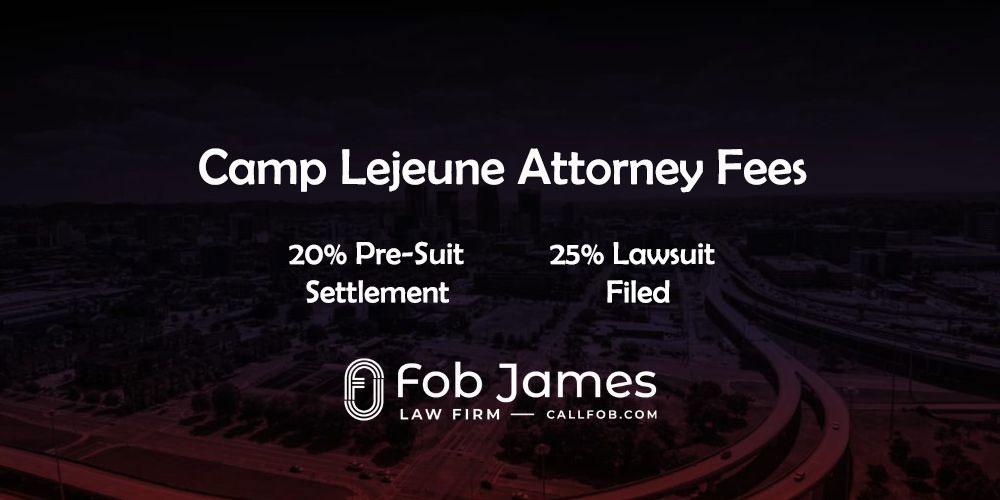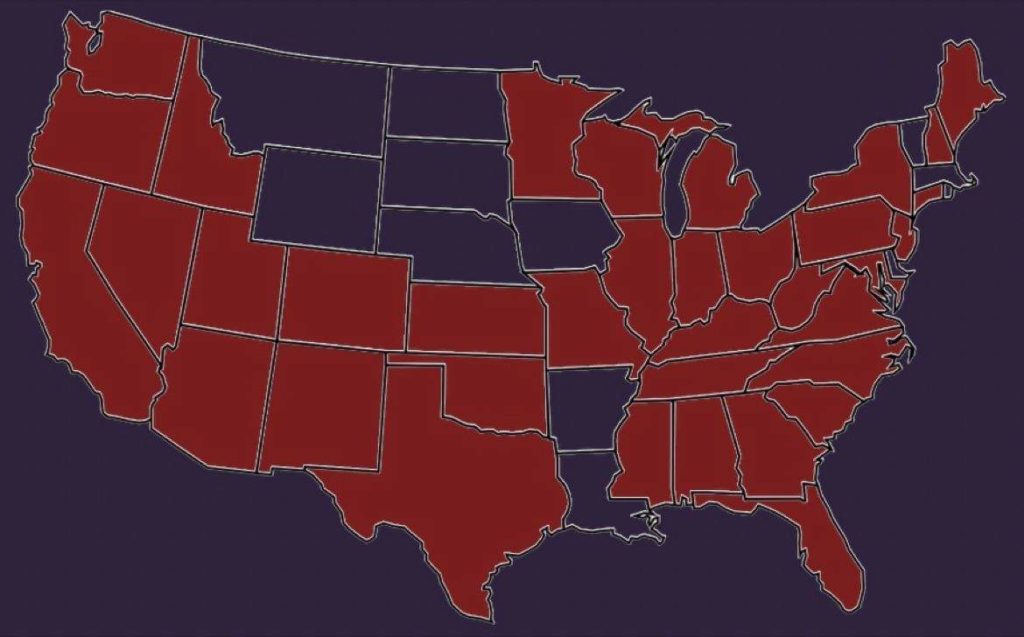
One of the most common questions we get from clients is “what are the attorney fees for the Camp Lejeune water contamination lawsuit?”
Although most other law firms are charging fees of 40%, our Camp Lejeune attorney fees are 20% or 25% of the total recovery, depending on the stage your case is resolved or settled.
Camp Lejeune Attorney Fees Should Be Capped At 20% or 25%
Fob James Law Firm honors the attorney fee caps in both the Federal Tort Claims Act and Camp Lejeune Justice Act of 2021.
Historically, the Federal Tort Claims Act (FTCA) applies to negligence claims against the government. The FTCA expressly limits attorney fees to 20% for administrative settlements or 25% for litigation recoveries.
Likewise, the Camp Lejeune Justice Act of 2021 limited attorney fees to 20% or 25% of the amount recovered.
However, the Camp Lejeune Justice Act of 2022 signed into law by President Biden on August 10, 2022 did not include the attorney fee cap provision that was in the 2021 version. This has caused widespread confusion and many law firms are charging 40% contingency fees or higher.
To clarify the issue, the government announced in September 2023 that attorney fees for Camp Lejeune settlements are capped at 20% or 25%. The goal of the fee caps is to protect the financial interests of affected veterans.
If your Camp Lejeune claim is resolved without litigation, the attorney’s fee is 20% of the settlement. And if your claim is resolved after filing a lawsuit, the attorney’s fee is 25% of the total amount recovered.
Three Reasons For Capping Fees At 25%
The attorneys fees in Camp Lejeune water contamination cases should be capped at 20% or 25% for three main reasons:
- The Federal Tort Claims Act historically caps attorney fees at 20% or 25%. The Camp Lejeune Justice Act of 2022 incorporates the claims process of the FTCA.
- The Camp Lejeune Justice Act of 2021 provided that the attorney fees are limited to 20% or 25% of the settlement. This provision was later removed from the Camp Lejeune Justice Act of 2022 but the language incorporating the claims process of the FTCA remained.
- The Department of Justice and Navy have unequivocally stated that attorney fees for Camp Lejeune settlements are capped at 20-25%.
Regardless, our Camp Lejeune lawyers charge either a 20% or 25% attorney’s fee depending on if your claim resolves without litigation. If we do not obtain a recovery then you owe us nothing, not even expenses.
To schedule your free consultation with an attorney at the Fob James Law Firm, give us a call at (833) 684-0503 or contact us online.
The Federal Tort Claims Act Caps Attorney Fees
Historically, negligence claims filed against the federal government are brought under the Federal Tort Claims Act (FTCA).
For example, before the Camp Lejeune Justice Act (CLJA) was signed into law, Camp Lejeune victims filed lawsuits against the federal government under the FTCA.
In most environmental tort cases where liability is disputed, law firms typically charge a 40% contingency fee.
However, under Section 2678 of the Federal Tort Claims Act, the attorney fees in tort claims brought against employees of the federal government are capped at a percentage of 20% or 25%, depending on the stage of the case.
| Stage of Case | Attorney Fees |
| Pre-Suit | 20% of the recovery |
| After filing suit | 25% of the recovery |
Hypothetical #1 – Your Case is Settled Before Filing a Lawsuit
If your claim is resolved administratively (e.g. the claim is submitted to the Department of Defense and it settles the claim administratively), the lawyer’s fee is capped at 20% of the total recovery.
For example, say your case settled pre-litigation for $100,000.00, the attorney’s fee would be $20,000.00.
Hypothetical #2 – You File a Lawsuit
If your claim is resolved by settlement or judgment after the filing of a lawsuit, the lawyer’s fee is capped at 25% of the total recovery.
In this situation, if your case was resolved after filing a lawsuit for $100,000.00, the attorney’s fee would be $25,000.00.
The Camp Lejeune Justice Act of 2022 Incorporates the Claims Process of the FTCA
The Camp Lejeune Justice Act in Section 2 paragraph (g) specifically incorporates the FTCA’s legal process set forth in 28 U.S. Code § 2675:
(g) Disposition By Federal Agency Required.—An individual may not bring an action under this section before complying with section 2675 of title 28, United States Code.
S.3176
This means that Camp Lejeune claims must first be submitted to the Office of the JAG. Thereafter, the JAG will have six months to administratively resolve the claim.
If the claim is not resolved within six months, claimants can file lawsuits in federal court in North Carolina.
Because the CLJA incorporates the FTCA’s claim process and tort claims against the federal government are historically brought under the FTCA, we believe that Camp Lejeune lawyer fees should be capped at 20% or 25%.
The Camp Lejeune Justice Act Of 2021 Limited Attorney Fees To 20% or 25%
The March 26, 2021 version of the Camp Lejeune Justice Act [H.R. 2192], which was introduced to the House of Representatives, specifically limited attorneys fees to 20% or 25% based on Section 2678 of the FTCA:
(H) ATTORNEY FEES.—ATTORNEY FEES FOR SERVICES PROVIDED TO AN INDIVIDUAL SEEKING A REMEDY UNDER THIS SECTION SHALL BE IN ACCORDANCE WITH SECTION 2678 OF TITLE 28, UNITED STATES CODE [FTCA].
H.R. 2192
This attorney fee provision was later removed from the Senate’s 2022 version of the bill [S.3176]. However, Section 2(g) of the Camp Lejeune Justice Act, which incorporates the claims process of the FTCA, remained in the final bill passed by Congress and signed into law. As a result, Camp Lejeune attorney fees should be limited pursuant to the “spirit” of the bill.
In any event, Fob James Law Firm honors the FTCA and original version of the CLJA, thus our Camp Lejeune attorney fees are limited to 20% or 25% of the total amount recovered.
The Government Says Camp Lejeune Attorney Fees Are Capped at 20% or 25%
In September 2023, the government announced that attorney fees are capped under the Elective Option.
Likewise, the government reiterated on its webiste that attorney fees are capped with any judgment or settlement process.
Attorney Fees Are 20-25% Under the Elective Option
The JAG and DOJ released guidance on attorney fees for settlements under the Elective Option (EO). The EO is a voluntary settlement process for a limited number of claims.
According to the Navy and DOJ, attorney fees for EO settlements are capped at 20-25% pursuant to the FTCA:

Attorney Fees Are 20-25% With Any Camp Lejeune Settlement or Judgment
The Department of Justice issued a notice to attorneys on its Camp Lejeune website stating that the attorney fee caps apply to any judgment or settlement, not just the Elective Option:

The DOJ’s filed a Statement of Interest with the Court on October 27, 2023, further arguing its position.
Accordingly, the Navy and DOJ will most likely include an attorney fee cap condition on future settlements made with the federal government.
May 9, 2024 Update – The DOJ Reiterates the Government’s Stance
The DOJ suggested in a joint status report filed with the Court that some Plaintiff firms are complaining about the government’s stance that attorney fees should be capped at 20-25%.
The DOJ believes the Court clarifying the attorney fee issue would facilitate the settement process.
Legislators and Veteran Groups Are Seeking An Amendment To The Camp Lejeune Justice Act
Many law firms are charging high fee percentages because they are spending millions of dollars in advertising. Also, many law firms are referring cases to other law firms that will actually do the work.
These law firms must charge higher legal fees to recoup marketing costs or to compensate multiple law firms.
Due to the exorbitant fees charged by some law firms, legislators are considering legislation capping attorney fees for CLJA claims.
Fee Cap Proposals in the House of Representatives
On December 6, 2022, Rep. Mike Bost, R-IL., along with Rep. Darrell Issa, R-CA and eight others introduced legislation in the House of Representatives to cap Camp Lejeune lawyer fees at 25%. This legislation tracks the fee caps under the FTCA and the fees charged by Fob James Law Firm.
On February 28, 2023, Reps. Jerrold Nadler (N.Y.) and Mark Takano (Calif.) introduced a bill that would limit attorney fees to 20% of a settlement reached within 180 days of presenting a claim to the JAG. If the claim did not settle within 180 days, the attorney’s fee would be limited to 33.33%.
As of December 2024, no bill has been presented for a vote. Efforts to pass legislation in the House have stalled.
Fee Cap Proposals in the Senate
Through the Protect Camp Lejeune VETS Act, Senator Sullivan has proposed fee caps of 12% if the case is administratively resolved or 17% if a lawsuit is filed. This proposal is endorsed by the American Legion and co-sponsored by 13 other senators.
On the other hand, Senator Durbin has indicated he will propose fee caps of 20% if the case is administratively resolved or 33.33% if a lawsuit is filed.
We believe that if a fee cap amendment is passed, the fee caps will fall somewhere in between Senator Sullivan and Senator Durbin’s proposals (e.g. 25%).
September 2024 Update – Senator Rubio Introduces Bill to Amend the CLJA
Senators Rubio and Tillis introduced a bill to streamline the Camp Lejeune claim process. As everyone is aware, Camp Lejeune claims are moving very slowly through the Court system. The government is fighting tooth and nail on every issue. This is not what the legislature intended when it passed the CLJA back in 2022.
As a result, Rubio and Tillis want to ammend the CLJA to simplfy the process and clarify contested issues. One of these issues is attorney fees. The proposed bill caps attorney fees at 20% for settlements and 25% for tlitigation. This of course is what we have been charging all along.
July 2025 Update – NC Congressman Introduces Ammendment to the CLJA
US Rep. Richard Hudson, R-NC9, and three other co-sponsors introduced the Ensuring Justice for Camp Lejeune Victims Act to streamline the process for adjudicting CLJA claims and also resolve pending legal issues.
As everyone is aware, the Camp Lejeune claims process has not gone as congress intended. The DOJ is fighting every legal and fact issue it can. As a result, the Camp Lejeune litigation has morphed into another “mass tort” that will go on for years unless the law is amended.
This is exactly what the Ensuring Justice Camp Lejeune Victims Act accomplishes. As currently drafted, the bill would do the following:
- Jury-trials: The bill guarantees the right to request a jury trial, clarifying ambiguity in the original law.
- Causation standard: Claimants would only need to establish general causation rather than specific causation.
- Expanded court access: It allows cases to be heard in any federal court in North or South Carolina, thus alleviating some of the bottleneck.
- Attorney-fees: The bill caps attorney fees at 20% for administrative settlements and 25% for litigation.
When Will The Camp Lejeune Lawsuit Be Settled?
Diseases in the Camp Lejeune litigation are grouped into separate “tracks”. Each track will have its own discovery and scheduling order.
Track 1 is currently in the pre-trial motion stage of the litigation. The “bellwether” trials for the track 1 will likely begin in 2026. All other cases are stayed pending the outcome of the track 1 trials.
For cases that meet the criteria under the Elective Option, the government is making offers on its own time. The government must first determine that a case qualifies under the EO before making an offer. Since we are dealing with the government, this process is slow.
Most cases do not qualify for the Elective Option and many EO offers will be rejected. As a result, the majority of cases will settle through the litigation.
At this time we do not think a global settlement will be reached before bellwether trials begin in 2026.
Related Content: Read our blog for the latest news and updates on the Camp Lejeune litigation.
Contact Fob James Law Firm If You Need Help With Your Camp Lejeune Water Contamination Claim
Fob James Law Firm is honored to represent veterans and their families all over the country in connection with their Camp Lejeune claims. We currently represent clients in 49 states and counting as of September 2025.

Regardless of where you reside, all Camp Lejeune claims are initially filed with the Office of the JAG. If the claim is not resolved administratively, lawsuits are filed in federal court in North Carolina.
If you would like to discuss a Camp Lejeune claim, please call us toll free at (866) 837-1010. You can also reach out online today for a free, no-obligation consultation.
